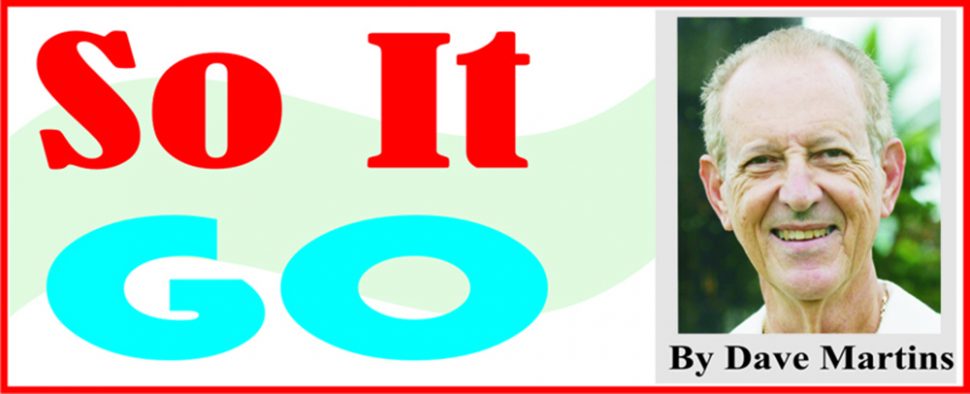I have to declare that in the midst of all the high-tech life we’re enmeshed in these days, right in the very heart of it, like sitting in an airport lounge in North America recently, my mind, seemingly on its own, will take charge of me, like a tap on the shoulder, and send me back to some crystal clear memory (I’ve mentioned some of them before) that ends up slowing me for a few minutes, literally not moving, reliving what once was, photographs of life in some reservoir somewhere, some of them very old, but all of them crystal clear and sometimes suggesting music.
One of them goes back to the time when the Martins family lived at Vreed-en-Hoop (I was going to school at Saints on a scholarship) and we would spend a good portion of the August school break at my father’s farm in the Pomeroon, about two miles downriver from Charity. Apart from his farm work, Joseph Francis Martins, son of Portuguese immigrants, had some contracts to clean vegetation from the Pomeroon riverain with its many creeks. Although I must have been in the way on those jobs, he sometimes took me with him, particularly when the creek was nearby. Most of them are lost in my memory, but one I remember involved a creek somewhere upriver, in the Pickersgill area, about four miles from Charity, and while I have no recollection of the creek, I remember like a photograph our spending the night in the Pickersgill sawmill, slinging our hammocks amidst the machinery, within reach of the mosquitoes, but sheltered from the rain. The memory that comes back sharpest for me is one of waking up, in the dead of night, totally startled because I had managed, while sound asleep, to somehow swing in my hammock (likely in a dream) and hit my head a sharp blow against some formidable cast-iron piece of machinery. I remember being startled out of my slumber, still hearing the blow, and embarrassed that someone else in the group may have heard it. I was rubbing the spot, as quietly as I could, hoping no one was aware of my gaffe. From casual enquiries in the morning, I gleaned that no one was aware of the clunk.
Another vivid memory has to do with the bus ride from Adventure on the Essequibo shore line to Charity on the Pomeroon en route to my father’s farm on that river. We always made that linking ride on one of the buses operated by Kass (I never knew his first name) and what an experience. Usually full of passengers, the bus also carried a bewildering array of various freight and luggage items that often left me wondering where all this stuff was going. Everything from full milk cans and empty ones, to bags of flour, potatoes, potted plants, gardening tools such as forks, spades, cutlasses and water cans, and even bicycles…literally everything for mankind settling into essentially a bush environment. How Kass’ crew didn’t get confused as to what belonged to who I didn’t know, but minus the tags or numbers one would expect they somehow never got it wrong; nobody got off the bus minus anything.
Another bus ride into hinterland involved the East Bank trip from Georgetown to Timehri in the days when I worked at B. G. Airways at Atkinson Field, moving between that place and our family home at Vreed-en-Hoop. On one of those journeys, going back to Atkinson, I, very much a teenager, was in the company of some “big people”, coming back from a Georgetown trip, with Shell boss Rudy deBruin (a lovable Trini) and some other guys, engrossed with finishing a bottle of rum before they reached base. In the hurry to open the booze without stopping the vehicle, they accidentally broke off the neck of the bottle, but instead of tossing it away, one of the guys took off the nylon shirt, popular at that time, he was wearing, strained the rum through it into an empty bottle, and continued the long drive to Atkinson, all without stopping or even slowing the vehicle. Rudy was one very cavalier dude.
Another journey I remember was a weekend trip to a creek near Charity (Gerry Goveia now has his Arrow Point Resort there) where we did our own cooking and, as we later learned that night, one of the guys making the cook-up had stirred the rice, in total darkness, using a piece of wood from the fire. That only came to light when, going hungrily into the cook-up one kept encountering small, hard, black pieces of something that was simply inedible; as the kerosene lamp showed us, we were chewing on the occasional snippet of charcoal, but by then the hunger was such that we simply tossed it aside and kept eating.
The hinterland prods one into improvisation. Over-nighting at Shell Beach, with my wife Annette, we found ourselves, late at night, in our camp with its outdoor toilet, and both needing a bathroom break. Annette braved hers with a running trip to the outhouse, dodging the mosquitoes, while I took the coward’s way out – peeing carefully into a Ziploc bag and emptying it when the sun came up and the mosquitoes had gone home.
I close this column with a note I just saw on Facebook (I cannot remember the author) which has nothing to do with the hinterland, but is so pertinent to Guyana today that I must relay it. It said: “Arthur Chung was elected as our country’s first President on March 17, 1970 under the leadership of Forbes Burnham, the same year that Guyana became a republic. At his swearing in, he said: “Our survival as a nation will depend on how well we work together.” Prophetic.





